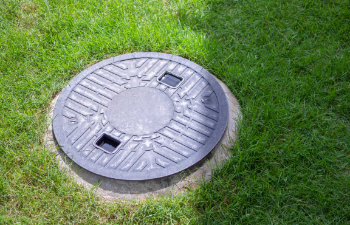Do You Know How Your Septic System Works?

Most people don’t think about their septic system until there’s a problem. At Septic Service Pro, serving North Fulton, Gwinnett, Hall, and Forsyth counties, we believe that understanding the basics of how your septic system works can save you a lot of stress and money.
If you own a septic system, you’re responsible for its care. Knowing what happens underground helps you avoid costly repairs and prevent septic failures that could damage your home and property.
How Your Septic System Works
A septic system is an underground wastewater treatment structure, common in rural and suburban areas without centralized sewer systems. It’s made up of two main parts: the septic tank and the drain field.
When you flush a toilet, run a washing machine, or pour something down the sink, that water flows into the septic tank. Inside the tank, solids settle at the bottom, forming a layer of sludge. Oils and grease float to the top, creating a layer of scum. The remaining liquid, called effluent, flows out into the drain field, where it naturally filters through the soil.
This process relies heavily on bacteria to break down waste. Healthy bacteria are essential to keeping your septic system functioning properly.
Why Understanding Your Septic Matters
If you don’t know how your system works, you might accidentally do things that cause serious problems. Septic systems are tough, but they are not invincible. Overloading them with water, sending the wrong materials into the tank, or skipping maintenance can lead to backups, foul smells, and even system failure.
Repairs can be costly and, in some cases, require full system replacement. Knowing how to care for your system — and what to avoid — helps protect your home and your investment.
What You Should Never Flush or Pour Down Drains
Many common household items can cause major septic problems if flushed or washed down the drain. Even products labeled “flushable” aren’t always safe for septic systems. Never put these items down your drains:
- Baby wipes or “flushable” wipes
- Paper towels
- Feminine hygiene products
- Cooking grease or oil
- Harsh chemicals like bleach or drain cleaners
- Cat litter
- Cigarette butts
- Dental floss
- Medications
These items can clog your pipes, disrupt the bacteria in your tank, and cause major system blockages. Stick to flushing only human waste and toilet paper. When it comes to your drains, avoid pouring anything down that isn’t biodegradable and septic-safe.
Also, too much water at once can overwhelm your septic system. Spread out laundry loads, fix leaking toilets, and install water-efficient fixtures. Protecting your system from overloading is key to long-term health.
Schedule Regular Maintenance
Even a well-treated system needs professional help from time to time. Regular septic pumping and inspections from Septic Service Pro can catch small problems before they turn into big ones.
Most tanks need pumping every 3 to 5 years, depending on household size and usage. We’ll help you determine the best schedule for your system.
Your septic system works quietly in the background, but it needs the right care to keep doing its job. Understanding how it operates — and what not to flush — is the best way to avoid expensive problems down the road.
At Septic Service Pro, we’re here to help you keep your system running smoothly. Serving North Fulton, Gwinnett, Hall, and Forsyth counties, our experienced team offers expert maintenance, repairs, and advice you can trust. Call us today to schedule your septic inspection or pumping — and keep your system working the way it should!

